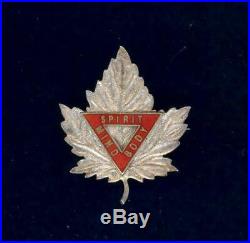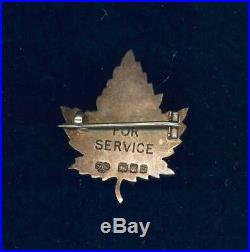Cef Canadian Ymca Cap Badge Or Sweetheart Pin-1917 London Sterling Silver Marked




Offered is an incredibly rare WW1 C. Cap badge or sweetheart pin/badge in Sterling Silver, London Hallmarked 1917, in superb condition. The badge is beautiful, with a stunning WW1 Canadian maple leaf cap badge design. The badge depicts a large detailed maple leaf in sterling silver with red enamel Y. Triangle in centre, with the words "Spirit Mind Body" on each side. The reverse is of solid construction, with working pin and fastener. The badge is engraved "FOR SERVICE" on the center of the reverse, with four clear sterling markings below.
"G&S CO LTD" - LION- LION Face- "b" This indicates that the badge was produced in 1917 in London, with the lowercase "b" being the year 1917. G&S CO LTD (Garrand and Son) produced many high quality sterling silver sweetheart pins during WW1 which are sought after, some of which I have owned. Interestingly, the badge design appears similar to the "Canadian Design" cap badge listed on page 94-95 of the Charlton Standard Catalogue of First World War Canadian Corps badges, with slight variations in style. This badge has an excellent aged silver patina, and is beautiful on display- a fine, hard to find WW1 badge for your consideration.
Measures 37 mm (1 3/8 inches) high X 30 mm (1 3/16 inches) wide. ALL items that I sell are guaranteed to be 100 percent original and off the period described. Some History on the Canadian Y. A variety of national organizations did volunteer and charity work during the First World War, including the Imperial Order of the Daughters of the Empire (IODE), the Red Cross, the YMCA, the YWCA, and the Women's Patriotic Leagues. YMCA The YMCA established services overseas again in the First World War, as did British and later American chapters of the YMCA, setting up canteens and other services in the vicinity of the battle front for soldiers. Those services were broadly divided into five major areas; business, athletics, entertainment, education, and religion. While not identified with any particular church, the YMCA also worked initially in conjunction with the Canadian Chaplain Service to provide spiritual support. Personnel Personnel of the YMCA were subsidized by the Canadian government, and operating funds came from canteen profits as well as public subscription. While six YMCA Secretaries had accompanied the First Contingent to the UK (with the honourary rank of Captain), there was great reluctance on the part of the British to permit them to go to the Continent. However, according to David Love's book A Call To Arms, within a year they were able, through example of service and hard work, to justify their presence.
Some officers received pay and allowances from the YMCA, others from the Canadian government. In 1918, the Canadian Government formalized the role of the auxiliary services (see below). As part of the formal military establishment, the YMCA began to be administered as a department at Canadian Corps headquarters, with control of its own stores, equipment and offices, and the Senior YMCA officer taking his place in the chain of command, reporting to the Deputy Adjutant and Quartermaster General (DA & QMG) of the Corps. Internal Organization Internally, the YMCA had an Executive Committee composed of department heads, senior officers in each Canadian Division, and the Senior Officer, who in turn reported to the Chief Supervisor, Canadian YMCA in London, who in turn reported to the National YMCA Council at home in Toronto. Services The YMCA War Services offered soldiers much in the way of moral and physical comfort, helping provide entertainment, facilities and sports equipment for recreation, religious programs, as well as reading rooms, canteens, stationery and supplies for writing home, and reading material. The YMCA War Services were especially known for their tea service, where staff distributed hot tea (during both World Wars, tea was the staple beverage among military servicemen, as it was in the British Army) and biscuits, writing paper, reading material and other amenities, sometimes right in the front lines by the creation of YMCA dugouts.
Second World War There were four primary National Voluntary Organizations active during the Second World War, following a Government announcement in Nov 1939: Canadian Legion War Services Knight's of Columbus Canadian Army Huts Salvation Army Canadian War Services Canadian Young Men's Christian Association (YMCA) Overseas The objective of these organizations was to care for the physical welfare of the men (while the Canadian Chaplain's Service cared for the spiritual welfare). Civilian representatives of the services were permitted to serve in the field with units of the Canadian military, and wore uniforms with appropriate insignia; they did not hold rank in the armed forces and were referred to as "Supervisors", though they enjoyed officers' priviliges and were paid by the Government the same salary as a captain in the Army. The item "CEF Canadian YMCA cap badge or sweetheart pin-1917 London sterling silver marked" is in sale since Thursday, July 16, 2020. This item is in the category "Collectibles\Militaria\WW I (1914-18)\Original Period Items\Canada".
The seller is "fadedbanners" and is located in St. John's, Newfoundland And Labrador. This item can be shipped worldwide.


